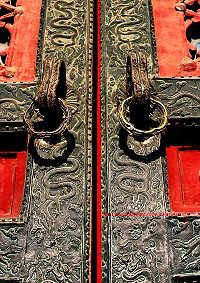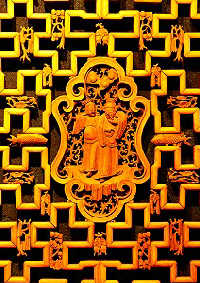| Chinese Way > Daily Highlight | กก |
|
Doors and Windows to the Soul
People in ancient China emphasize the simple and unsophisticated beauty of a structure's doors and windows. Most traditional Chinese doors and windows are made of brick, wood and stone -- be it a humble or wealthy home. Sometimes, even memorial temples, pavilion s and cloisters use such building materials.
In the late Qing Dynasty (1644-1911), rich merchants adorned their doors and windows with gold foil.
Traditional
Chinese doors and windows embody the concept of fengshui (also called
"the geography of the yin and the yang"). A building's door and window locations
were usually governed by the theory of fengshui in ancient China.
Regarding the placement of doors and windows, the theory of fengshui
focuses on highlighting the natural scenery and sunlight. According to
historical records, a box and needle invented by Wu Lu of the Ming
Dynasty was used to make presumptions about the location of each door and
window according to fengshui .
|
|||||
 |

 Natural Beauty
Natural Beauty

 Fengshui
Fengshui